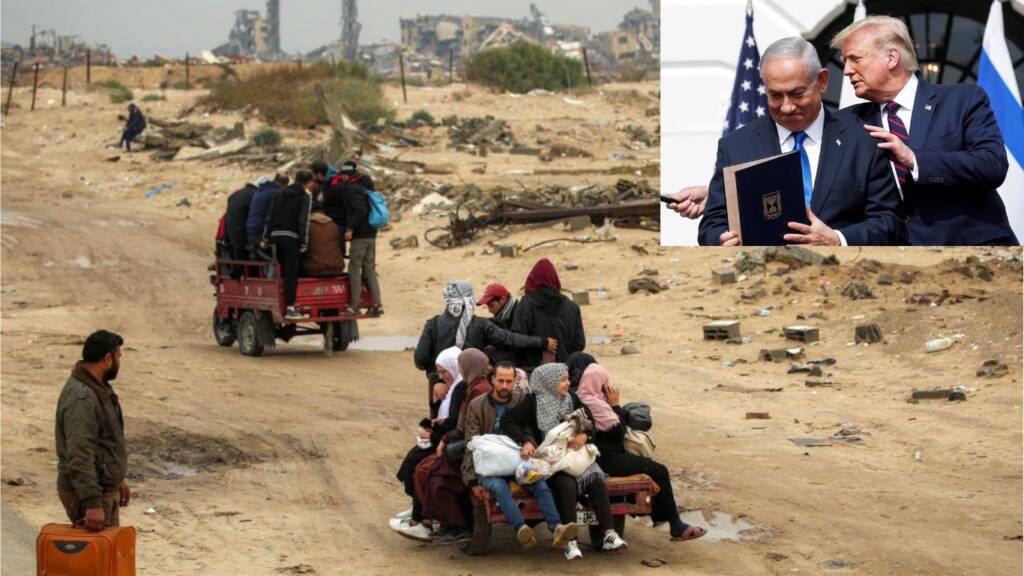As per the media report, it has revealed that officials in the Trump administration discussed a contentious plan to permanently relocate up to 1 million Palestinians from the Gaza Strip to Libya. According to the sources, the proposal was under serious consideration during Trump’s presidency, though no agreement was ever finalized.
Unfreezing of Libyan Funds in Exchange for a large number of Palestinians
The discussions reportedly involved talks with Libyan leaders and included the idea of unfreezing billions of dollars in Libyan funds held by the United States for over a decade. In exchange, Libya would accept large numbers of Palestinians from Gaza. Sources told NBC News that Israeli officials were also kept informed about the idea.
However, after the report was published, a spokesperson for the U.S. State Department firmly denied that such a plan was ever discussed. “These reports are untrue,” the spokesperson said. “The situation on the ground is untenable for such a plan. Such a plan was not discussed and makes no sense.”
Despite the denial, the idea appears to have been explored during the Trump administration, with one former U.S. official saying the proposal included offering Palestinians incentives such as free housing and a regular stipend to encourage them to leave Gaza for Libya.
Also Read: Israel prepares plans to evacuate Palestinians via Ports, Borders, and Airports.
Palestinians, Rooted in Their Homeland
Basem Naim, a senior Hamas official, said his group had not heard of any such proposal. He strongly opposed the idea, emphasizing that Palestinians are deeply connected to their homeland. “Palestinians are very rooted in their homeland and are ready to fight to defend it,” Naim told NBC reporter. “Only Palestinians have the right to decide their future.”
Israel declined to comment on the report. Libya, which remains politically divided and unstable, has not publicly responded. The internationally recognized government in Tripoli, led by Abdulhamid Dbeibah, could not be reached for comment. The rival eastern-based Libyan National Army, led by General Khalifa Haftar, also did not respond.
Logistically, a Difficult Work
Logistically, moving such a large number of people would be extremely difficult. Gaza does not have an airport, meaning any air travel would need to begin from Cairo, Egypt, which is about 200 miles away. For a large-scale move by air, approximately 1,173 flights on the Airbus A380 — the world’s largest passenger jet — would be needed to transport 1 million people.
Overland travel from Gaza through Egypt to eastern Libya would be about 1,300 miles, mostly across desert terrain. Using intercity buses, which typically carry about 55 people, would require around 18,200 bus trips.
Another option would be by sea. In 2011, the U.S. used large ferries to help people escape Libya during its civil war. Top-end ferries can carry up to 2,000 people, but moving 1 million Palestinians would still take hundreds of long trips across the Mediterranean.
Many questions remain unanswered, including how many Palestinians would be willing to leave Gaza. The political, social, and emotional ties to their land are strong, and there is no guarantee that Libya, a country still recovering from years of conflict, could handle such a massive population shift.
While the plan appears to have gone nowhere and was denied by the current U.S. administration, its existence, even as a concept, has raised concerns. Critics say it reflects a lack of understanding of the Palestinian cause and the deep history tied to Gaza. Supporters, if any exist, have not come forward publicly.
The report comes at a time of ongoing humanitarian crisis in Gaza, where millions live under blockade and frequent violence. Whether real or just a theoretical discussion, the idea of mass relocation touches on sensitive issues of identity, displacement, and regional stability.
